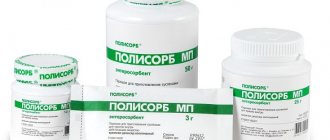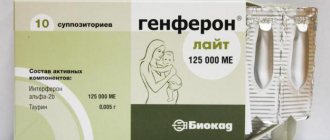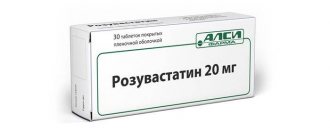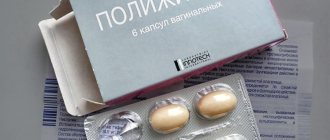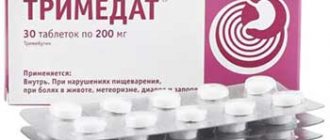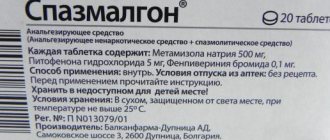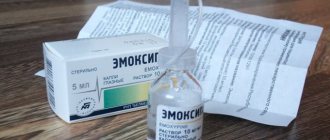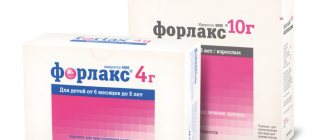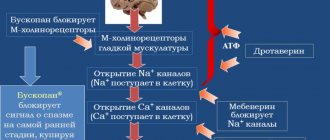Thrombo ACC is a popular medicine whose active ingredient is aspirin (acetylsalicylic acid). Below you will find instructions for using this drug, written in clear language. Find out what its indications for use, contraindications and possible side effects are. Find out how to take Thrombo ACC - in the morning or evening, on an empty stomach or after meals, duration of use, compatibility with other medications. As a rule, these tablets are taken 1 piece every day for blood thinning, to prevent heart attack and stroke. Patients also often use Thrombo ACC for varicose veins, although doctors believe that this is not effective. Many patients are interested in which drug is better - Thrombo ACC or Cardiomagnyl? Below is an objective answer to this question.
Drug card
| Manufacturer | Lannacher (Austria), Valeant (Russia) |
| ATS code | B01AC06 |
| Pharmacological group | Antiplatelet agents, NSAIDs - salicylic acid derivatives |
| Active substance | Acetylsalicylic acid |
| Release form | Enteric-soluble film-coated tablets |
| Package | There are 10 tablets in a blister, 3 blisters in a box. |
Contraindications
The drug has a wide range of uses.
Thus, it is prescribed for the prevention of heart attacks, ischemic strokes, treatment of angina attacks, and improvement of blood circulation in the brain. The product is mandatory for use after vascular surgery (angioplasty, bypass surgery, stent installation), as it prevents the formation of emboli and blood clots. It is also used to treat varicose veins, deep vein thrombosis, venous insufficiency and other diseases.
The drug is prohibited for use by patients with the following conditions, circumstances and diseases:
- children under 18 years of age;
- hemorrhagic diathesis;
- erosions and ulcers of various organs of the gastrointestinal tract;
- hemorrhages in the stomach or intestines;
- bronchial asthma resulting from the use of anti-inflammatory drugs and salicylates;
- bronchial asthma in the presence of nasal polyps;
- pronounced menstruation;
- liver failure;
- pregnancy, lactation;
- severe renal failure;
- severe heart failure;
- allergy to the components of the drug;
- lactose intolerance and problems with glucose processing.
The use of tablets is contraindicated for:
- erosive and ulcerative lesions of the gastrointestinal tract;
- hypersensitivity to the components of the product;
- bronchial asthma, which is caused by the use of salicylates and non-steroidal anti-inflammatory drugs;
- combination of bronchial asthma, reducing polyposis of the nose and paranasal sinuses, intolerance to acetylsalicylic acid;
- children under 18 years of age;
- bleeding in the gastrointestinal tract;
- hemorrhagic diathesis;
- pregnancy (I and III trimester);
- breastfeeding.
The medicine is used with caution in the following cases:
- bronchial asthma;
- gout;
- a history of ulcerative lesions of the gastrointestinal tract or gastrointestinal bleeding;
- hay fever;
- allergies to other medications;
- hyperuricemia;
- renal failure;
- liver failure;
- chronic diseases of the respiratory system;
- nasal polyposis.
During the second trimester, pregnant women should also use Thrombo ACC with caution.
Additional recommendations
The medication is prescribed with caution if the patient:
- Hypersensitivity to analgesic, anti-inflammatory, antirheumatic and other drugs;
- Peptic ulcer of the gastrointestinal tract of any form and bleeding;
- In parallel, anticoagulants were prescribed;
- Renal or hepatic dysfunction.
In case of allergic complications (bronchial asthma, allergic rhinitis, urticaria, itching, swelling of the mucous membrane, nasal polyps) and their combination with pulmonary infections, as well as in patients with intolerance to NSAIDs, bronchospasms and exacerbation of asthma are possible.
During operations (including dental surgery), the use of Thrombo Assa provokes increased bleeding
In small doses, aspirin reduces the excretion of uric acid. This contributes to the exacerbation of gout in patients with poor elimination of this compound.
With influenza types A and B, chickenpox and other viral infections, there is a risk of Reye's syndrome, an illness that requires immediate hospitalization. Exposure to aspirin increases the risk, but the link cannot be proven.
The medicine contains lactose, therefore, in case of individual galactose intolerance, Lapp lactase deficiency or glucose-galactose absorption disorders, the antiplatelet drug is contraindicated.
Trombo ACC does not affect the ability to control complex mechanisms, including vehicles.
Instructions for use of Trombo ACC (Method and dosage)
Doctors indicate the need to use ThromboASS before eating. Do not chew or split the tablets. You need to take them whole and drink plenty of water.
The course of treatment may vary, depending on the doctor’s prescriptions. The daily dosage is 50-100 mg, but if you need to prevent more severe conditions (deep vein and pulmonary artery thrombosis), take 100-200 mg of the drug every day.
The medicine is taken orally before meals. The tablets cannot be chewed, but they can be taken with some liquid.
Instructions for use of Thrombo ACC indicate that the drug must be taken for a long time, but the exact duration of therapy is determined by the doctor. It depends on what the tablets are used in each specific case.
The usual dosage indicated by the instructions for Trombo Ass is 100 mg or 50 mg. Tablets are used once a day.
What does it help with, who needs it
Indications for use of the drug in question (“Thrombo ACC”) are varied. They are represented by the following pathologies:
- angina pectoris (stable, unstable),
- secondary prevention of myocardial infarction,
- prevention of transient cerebrovascular accident,
- stroke prevention,
- prevention of deep vein thrombosis, thromboembolism of the pulmonary artery and its branches,
- prevention of thromboembolism after surgical, invasive intervention in the vascular area (coronary artery bypass surgery, angioplasty, stenting of the coronary arteries, endarterectomy of the carotid arteries).
Patients who have been prescribed Thrombo ACC are interested in what pressure the tablets can be used at. In theory, the medicine can slightly lower blood pressure, but this has no definite clinical significance.
Important: If you have low blood pressure, the tablets can cause symptoms that are dangerous for the patient if you take a large dose of the drug. The therapeutic doses prescribed by doctors are much lower, so patients with hypertension and hypotension can safely take Thrombo ACC.
When to take ThromboASS?
Many patients ask how to take Thrombo ACC correctly - in the morning or in the evening, on an empty stomach or after meals, and most importantly, how long to take these tablets, and whether to take breaks. First of all, figure out whether you really need to take acetylsalicylic acid daily to prevent myocardial infarction and ischemic stroke.
People who have a high risk of blocking blood vessels with blood clots need to take Trombo ACC every day, without breaks, despite the possible side effects of the drug. In any case, do not start taking any medication on your own, but first discuss with your doctor. If the patient feels normal while taking aspirin daily, then this therapy is continued for life.
Neither foreign nor domestic experts recommend taking breaks for people who take acetylsalicylic acid daily for prevention. If the patient experiences severe side effects, then aspirin should be stopped completely or additional medicine should be added to protect the stomach.
ThromboASS is a drug popular among patients and doctors for the prevention of thrombosis and embolism. The active component of this drug is the well-known acetylsalicylic acid.
Its antithrombotic and antiaggregation effects have long been established in numerous laboratory and clinical studies, due to which it is actively used in the fight against thrombus formation.
The drug ThromboASS is available in tablet form. Each tablet, depending on the dosage, contains 50 or 100 mg of acetylsalicylic acid.
These doses are sufficient for effective prevention of thrombus formation in cardiac patients.
Typically, ThromboASS is prescribed at a dose of 50-100 mg once a day. The tablet should be taken before meals, preferably 10-15 minutes before meals. It must be swallowed with a small amount of drinking water.
In exceptional cases, however, it is permissible to chew the tablet, but in such a situation the effect of the drug will be unpredictable and the risk of adverse effects will significantly increase.
If you are prone to deep vein thrombosis of the lower extremities and thromboembolism, the dose of the drug can be increased to 100-200 mg once a day.
This should be done only after consultation with a specialist, since the risk of complications with this dosage increases.
In cardiological practice, ThromboASS is prescribed in the morning before meals.
This is due to the peculiarities of the body’s functioning during daylight hours, as well as the ability to notice the development of undesirable phenomena in time.
In some cases, mainly when it is necessary to take large doses of the drug, it is taken twice a day - morning and evening.
This is justified for thrombosis and embolism. By the way, aspirin acts as an analogue of ThromboASS.
Patients with cardiovascular diseases (coronary artery disease, angina pectoris, chronic heart failure, atrial fibrillation and others) should take ThromboASS for life.
This will ensure reliable prevention of the formation of blood clots in the chambers of the heart. We recommend that you learn more about blood clots in the left ventricle of the heart.
A patient taking antiplatelet drugs should be regularly examined by his or her physician and take the necessary blood tests to promptly identify complications of therapy.
To prevent thrombus formation in varicose veins of the lower extremities and other diseases, ThromboASS is prescribed in limited courses, usually for 1-2 weeks, until the coagulogram is normalized and blood clots are eliminated.
It should be noted that in this case, anticoagulants will have a greater effect than antiplatelet agents.
Additionally
Overdose is especially dangerous in elderly patients.
The drug should be used after a doctor's prescription.
The inhibitory effect of acetylsalicylic acid on platelet aggregation persists for several days after administration, and therefore the risk of bleeding may increase during surgery or in the postoperative period.
If it is necessary to absolutely eliminate bleeding during surgery, it is necessary, if possible, to completely abandon the use of acetylsalicylic acid in the preoperative period.
The combination of acetylsalicylic acid with anticoagulants, thrombolytics and antiplatelet drugs is accompanied by an increased risk of bleeding.
Acetylsalicylic acid in low doses can provoke the development of gout in predisposed individuals (those with reduced excretion of uric acid).
The combination of acetylsalicylic acid with methotrexate is accompanied by an increased incidence of side effects from the hematopoietic organs.
When concomitantly prescribing GCS and salicylates, it should be remembered that during treatment the level of salicylates in the blood is reduced, and after discontinuation of GCS, an overdose of salicylates is possible.
The combination of acetylsalicylic acid with ibuprofen is not recommended in patients with an increased risk of cardiovascular diseases, since the latter reduces the positive effect of acetylsalicylic acid on life expectancy, i.e. reduces the cardioprotective effect of acetylsalicylic acid.
When combining acetylsalicylic acid with ethanol (drinks containing alcohol), there is an increased risk of damage to the gastrointestinal mucosa and prolongation of bleeding time.
Impact on the ability to drive vehicles and operate machinery
During the treatment period, care must be taken when driving vehicles and engaging in potentially hazardous activities that require increased concentration and speed of psychomotor reactions, since the use of the drug Thrombo ACC can cause dizziness
Release form and composition
The drug contains acetylsalicylic acid as an active substance, as well as auxiliary components such as colloidal silicon dioxide, lactose monohydrate, MCC, potato starch.
We suggest you read: What is cognac good for?
The shell contains a copolymer of methacrylic acid and ethyl acrylate, talc, triacetin.
Film-coated tablets.
The drug is available in tablets - they have a biconvex shape. On the outside there is an enteric white shell. The surface of the tablets is glossy, sometimes slightly rough. The tablets are packaged in blisters of 14 units. There are 2 blisters in a pack. , Austria.
The doctor may prescribe ThromboASS in a lighter or increased dosage. So, the composition of the first is as follows:
- 50 mg acetylsalicylic acid;
- 28.5 mg microcrystalline cellulose;
- 65 mg lactose monohydrate;
- 5 mg starch;
- 1.5 silicon dioxide.
The shell is made of talc, triacetin and a copolymer of ethyl acrylate with methacrylic acid.
The second version of the tablets contains double the amount of active ingredients with similar fillers.
The main and only active component of the drug is acetylsalicylic acid. Each tablet contains 100 mg. The formula of the drug is supplemented with filler ingredients: lactose, silicon dioxide, cellulose, potato starch, triacetin, talc, methacrylate copolymer dispersion.
An Austrian company produces the drug in tablet form. Round, convex white tablets without a dividing line are covered with film. When stored correctly (in a dark, dry place, temperature up to 25 degrees Celsius), the manufacturer L. Pharma GmbH guarantees a shelf life of the drug of up to three years. Expired medicine is disposed of. The tablets are available without a prescription.
Analogs
You can replace the drugs with the following analogues:
- Aspirin cardio;
- Cardiopyrin;
- Anopyrine;
- Acecardine;
- Cormagnyl;
- Magnicor;
- Thrombogard;
- Polocard;
- Ekorin.
The most common substitute is regular aspirin (acetylsalicylic acid).
However, in its pure form, this drug is tolerated worse by patients than drugs with auxiliary components. The advantage of aspirin is its low cost - 10 - 15 rubles per pack.
Use of the drug Thrombo ACC: questions and answers
Below are answers to questions that patients often have about the use of the drug Thrombo ACC.
Thrombo ACC or Cardiomagnyl: which is better?
The companies that produce Thrombo ACC and Cardiomagnyl claim that their tablets are less irritating to the gastric mucosa than regular cheap aspirin preparations. Thrombo ACC tablets are coated with a special enteric coating, thanks to which aspirin does not come into contact with the walls of the stomach. Cardiomagnyl tablets do not have an enteric coating.
But they contain magnesium hydroxide in addition to aspirin. This substance supposedly protects the walls of the stomach from the harmful effects of acetylsalicylic acid. Unfortunately, independent studies do not confirm that Thrombo ACC and Cardiomagnyl cause side effects less frequently than standard aspirin tablets at the same doses.
If you cannot take regular aspirin due to side effects, then switching to Thrombo ACC or Cardiomagnyl is unlikely to help you out. There is no reliable information which of these two drugs is better. People who don't like one probably won't like the other. Please note that Cardiomagnyl tablets are not a good source of magnesium.
The magnesium hydroxide contained in this drug is a non-absorbable antacid. The human body does not absorb it. If you want to take magnesium for prevention and treatment, then pay attention to Magnesium-B6. For many people, magnesium supplements help reduce the dosage of medications for hypertension and heart rhythm disorders.
Thrombo ACC or Aspirin Cardio: which is better?
Thrombo ACC and Aspirin Cardio are similar drugs whose active ingredient is acetylsalicylic acid. Both tablets are enteric-coated, allowing aspirin to be absorbed in the intestines rather than the stomach. It is supposed to reduce the incidence of heartburn, abdominal pain, nausea and other side effects, especially gastrointestinal bleeding.
Unfortunately, there have been no serious clinical studies that could confirm or refute the advertising claims of the drug manufacturers Thrombo ACC and Aspirin Cardio. Experts doubt that both drugs cause fewer side effects than cheaper aspirin tablets when taken in the same doses.
There is no reliable information to suggest that Thrombo ACC is better than Aspirin Cardio, or vice versa. Articles in medical journals that describe the benefits of one of these drugs over another are hidden advertising, so you should not trust them. Foreign medical journals violate ethical standards for money, and domestic ones violate them even more.
How does Thrombo ACC affect blood pressure? Is it suitable for patients with hypertension?
Thrombo ACC probably has no effect on blood pressure if taken in recommended doses without overdose. In people whose blood pressure remains elevated despite taking medications, treatment with aspirin increases the risk of hemorrhagic stroke. First of all, together with your doctor, select an effective combination of medications for hypertension that can keep your blood pressure below 140/90 mmHg. Art.
Study the article “Hypertension” and use the methods described in it. Once hypertension is under control, the appointment of Thrombo ACC or another acetylsalicylic acid drug can be discussed. Once you start taking aspirin daily, do not try to reduce the dosage of blood pressure pills on your own initiative or stop taking them.
What can replace this medicine?
If you need to replace Thrombo ACC or other acetylsalicylic acid drugs, doctors usually prescribe tablets instead, the active ingredient of which is clopidogrel. These medications are Plavix, Lopirel, Zilt, Plagril. Such a replacement can be made only as prescribed by a doctor, but not as self-medication.
Comparison of advantages and disadvantages
Both drugs have the same mechanism of action and indications. The differences lie in the composition of the tablets.
The advantages of Cardiomagnyl include a lower risk of developing diseases of the digestive system, due to the presence of magnesium compounds in it. At the same time, one tablet contains a larger amount of active substance. An increased dosage of the drug (1.5 times more than Tromboass) may also be a plus, since when prescribing an increased dose, the medicine is more convenient to drink.
And the list of its disadvantages includes a slightly higher cost and the danger of taking it if the patient has kidney pathologies.
The advantage of Tromboass is the lower price of tablets. Also, many patients say that they tolerate it better than Cardiomagnyl.
The main disadvantage of Thromboass is the lack of components that can protect the inner walls of the stomach from negative effects.
Accordingly, based on the pros and cons of both drugs, we can conclude that Cardiomagnyl is better suited for those patients who have problems with the gastrointestinal tract, and Thromboass for those who have kidney disease.
Composition and dosage form of the drug ThromboASS
This medicine may enhance the effect of:
- Methotrexate - use with this drug at a dosage of 15 mg per week or higher is contraindicated; combinations in lower dosages are prescribed with caution;
- thrombolytic, antiplatelet, hypoglycemic drugs;
- Heparin;
- Digoxin;
- indirect anticoagulants;
- Valproic acid.
Interaction with alcoholic beverages leads to an additive effect. Thrombo ACC also reduces the effect of uricosuric drugs.
The elimination of salicylates is enhanced by the use of systemic corticosteroids, which weaken their effect.
The drug may enhance the effect of some drugs and inhibit the effect of others. Thus, an increase in the therapeutic effect is typical for the following drugs:
- Methotrexate;
- Digoxin;
- Valproic acid;
- non-steroidal anti-inflammatory drugs;
- insulin;
- anticoagulants;
- hypoglycemic agents;
- thrombolytics, antiplatelet agents;
- alcohol.
If ThromboASS is used with the following drugs, their effect is reduced:
- steroidal anti-inflammatory drugs (excluding hydrocortisone);
- ACE inhibitors and diuretics;
- Benzbromarone, Probenecid.
Interaction of Thrombo ACC with other drugs
Let's take a closer look at the information about the simultaneous use of tablets with other medications.
Acetylsalicylic acid can enhance the effects of the drugs listed below:
- methotrexate,
- drugs with anticoagulant, antiplatelet, thrombolytic effects,
- digoxin,
- selective serotonin reuptake inhibitors,
- valproic acid,
- hypoglycemic drugs,
- NSAIDs.
The use of acetylsalicylic acid reduces the effect of the following medications:
- diuretics,
- ACE inhibitors,
- drugs with uricosuric effects,
- systemic GCS.
pharmachologic effect
The drug is a non-steroidal anti-inflammatory drug.
As a rule, the tablets are well tolerated by patients. Negative reactions are observed only in rare cases.
The following unwanted side effects are known when taking the drug:
- digestive system: vomiting, nausea, heartburn, pain in the abdomen;
- hematopoietic system: increased incidence of bleeding and hematomas during and after operations. They can cause acute or chronic anemia with associated symptoms;
- CNS: tinnitus, dizziness, hearing loss;
- allergies: cardiorespiratory distress syndrome, rash, urticaria, rhinitis, itching, angioedema, swelling of the nasal mucosa, bronchospasm, severe allergic reactions, for example, anaphylactic shock.
In rare cases, the use of the drug can lead to gastric and duodenal ulcers, as well as transient liver dysfunction with an increase in the activity of liver transaminases.
As a rule, this drug does not cause any difficulties in patients and is mildly tolerated. But there is a list of side effects, one or more of which may rarely occur. They are as follows:
- heartburn;
- stomach pain;
- stomach and intestinal ulcers;
- nausea, vomiting;
- bleeding from the stomach and intestines;
- problems with liver function;
- tinnitus, hearing loss;
- dizziness;
- anemia;
- increased likelihood of bleeding;
- bronchospasm;
- anaphylactic shock;
- rashes, itchy skin;
- runny nose;
- swelling of the nasal mucosa, etc.
We suggest you read: Which icon helps against drunkenness
Undesirable consequences
| Organs and systems | Types of Unintended Effects | Occurrence frequency |
| Gastrointestinal tract | dyspeptic disorders, epigastric discomfort, abdominal pain; inflammation of the gastrointestinal tract, ulcers, erosions | often in some cases |
| Circulatory and lymphatic systems | intraoperative hemorrhages, hematomas, bleeding from the nose, gums, genitourinary organs | rarely |
| Immunity | skin allergies (rash, swelling, urticaria), bronchospasms; anaphylactic shock | moderate in some cases |
| Liver | transient failure with increasing levels of liver transaminases | rarely |
| Exchange processes | decreased elimination of uric acid, gout | at low doses |
| General disorders | dizziness, ringing in the ears | in case of overdose |
After an adaptation period, mild symptoms of adverse events disappear on their own.
In case of serious consequences, this result can only be achieved by discontinuing the drug.
Overdose
https://www.youtube.com/watch?v=jwQsOCTqyxc
Overdose is most dangerous for elderly people and children. For an adult, a dose exceeding 150 mg per kg of weight is dangerous. The symptoms of this situation are as follows:
- dizziness;
- hearing loss;
- headache;
- noise in ears;
- rapid breathing;
- excessive sweating;
- hyperventilation;
- confusion;
- respiratory alkalosis.
Overdose is treated by performing gastric lavage, forced alkaline diuresis, and also by administering large amounts of activated charcoal. Restore normal values of water-salt balance, as well as blood pH.
If you take ThromboASS in an amount of more than 300 mg per kg of body, a very severe overdose of the drug may occur. It is accompanied by multiple characteristic symptoms:
- problems with heartbeat;
- swelling of the lungs;
- respiratory alkalosis accompanied by metabolic acidosis as a compensatory reaction;
- hyperventilation, hyperpyrexia;
- symptoms of strangulation;
- ketoacidosis;
- dehydration of the body;
- respiratory depression;
- loss of blood pressure;
- problems with kidney function;
- toxic encephalopathy;
- hemorrhages in the stomach or intestines;
- CNS depression.
If the above signs and symptoms are present, the patient must be immediately hospitalized in a specialized hospital to provide emergency medical care. The first steps of help should be as follows:
- hemodialysis;
- gastric lavage;
- constant consumption of large amounts of activated carbon;
- forced alkaline diuresis;
- measures to normalize water and electrolyte balance;
- treatment of other symptoms of drug overdose.
It is believed that an overdose of this drug is unlikely. In the case of taking tablets in doses that significantly exceed the measure, the following symptoms are possible: nausea, tinnitus, confusion, vomiting, dizziness, malaise.
In case of overdose, induce vomiting, prescribe laxatives and activated carbon, and carry out alkalizing treatment.
Overdose often leads to serious consequences in elderly patients.
Symptoms of moderate and severe overdose develop with a single dose of 150-300 mg/kg or higher. In this case, respiratory alkalosis with compensatory metabolic acidosis, hyperventilation, difficulty breathing, hyperpyrexia, non-cardiogenic pulmonary edema, asphyxia, cardiac arrhythmia, cardiac depression, decreased blood pressure, dehydration, impaired glucose metabolism, renal dysfunction, tinnitus, deafness may occur. , bleeding in the gastrointestinal tract, hematological disorders, depression of the nervous system.
If symptoms of moderate or severe overdose appear, patients are immediately hospitalized and given emergency treatment. Forced alkaline diuresis, gastric lavage, restoration of water and electrolyte balance, normalization of acid-base balance, and taking Activated Carbon tablets are indicated. Treatment is symptomatic.
What are the causes of increased blood viscosity?
This may be a hereditary predisposition, poor-quality food poisoning, hypoxia, suffocation (excess carbon dioxide in the blood), erythremia (increased red blood cells in the blood), Waldenström's macroglobulinemia, diabetes, dysfunction of the adrenal gland, myeloma, amyloidosis, thrombophilia.
Other causes may include liver disease, inflammation of the adrenal gland, pregnancy, varicose veins of the legs, and thermal burns. In pregnant women, blood thickening occurs because their body is preparing for childbirth and wants to prevent blood loss. Viscous blood has the ability to clot faster, which is why a person does not die as a result of injuries.
https://www.youtube.com/watch?v=wFpeVfh3-WE
In case of severe bleeding, the body instantly rebuilds itself and increases the level of platelets in the blood, as a result of which blood clotting increases, it clogs the wound, and the body does not die. But when coagulability is constantly increased, then we are talking about some kind of disease that needs to be identified.
But it also happens that the level of platelets is reduced and hemoglobin is increased - then the person experiences constant bleeding and blood loss. This symptom is characteristic of some types of leukemia, myeloma, and Waldenström's macroglobulinemia.
In other words, the symptoms of increased blood viscosity and the degree of their detection are directly dependent on the disease that caused this syndrome, which is called hyperviscose.
During pregnancy
It is forbidden to take ThromboASS during the first trimester of pregnancy. This is due to the increased likelihood of negative effects on the fetus. The drug causes heart defects and cleft palate.
During the second trimester, the drug is not so dangerous for the unborn child, so its use is possible. But for this there must be a doctor’s recommendation, and the dosage per day should not exceed 150 mg. The duration of treatment should be short-term.
In the last three months of pregnancy, the use of this drug is strictly prohibited. This is due to the likelihood of premature birth caused by the influence of the drug. The artery duct in the fetus may also close prematurely, causing severe bleeding in the mother and unborn child. If ThromboASS is taken immediately before birth, it can cause severe intracranial hemorrhage in the fetus.
How to treat hyperviscose syndrome?
Of course, under the supervision of a doctor. Blood thinners are called antiplatelet agents and anticoagulants. Antiplatelet agents prevent platelets from sticking together and forming clots (aspirin and ticlopedin). Anticoagulants inhibit blood clotting (warfarin and heparin).
A drug that thins the blood and helps prevent thrombosis and embolism is called thromboASS. It contains acetylsalicylic acid, otherwise known as aspirin. Its properties have long been studied in laboratory and clinical studies. We are talking about the antithrombotic and antiaggregation effects of aspirin.
A drug that thins the blood and helps prevent thrombosis and embolism is called thromboASS. It contains acetylsalicylic acid, otherwise known as aspirin. Its properties have long been studied in laboratory and clinical studies. We are talking about the antithrombotic and antiaggregation effects of aspirin.
Precautions when taking ThromboASS
The shelf life of the drug is 3 years. It should be located in a dry and dark place where children cannot reach.
The medicine can be sold without a prescription. However, it is advisable to consult a doctor before using it. Only he knows what indications for the use of Thrombo ACC are in each specific case and how long the drug should be used.
This product should be stored in a dry and dark place. The optimal temperature is up to 25°C. The drug should be kept away from children.
Acetylsalicylic acid is a powerful inhibitor of cyclooxygenase, an enzyme that is essential for the synthesis of substances involved in the process of inflammation and thrombus formation.
However, these same compounds support the normal functioning of other organs and systems, so certain precautions must be taken when taking ThromboASS.
The most serious side effects are:
- NSAID gastropathy, characterized by the formation of erosions and ulcers on the mucous membrane of the stomach and duodenum, as well as, in addition, gastrointestinal bleeding.
- “Aspirin asthma” is a variant of bronchial asthma. Acetylsalicylic acid, which is part of the drug ThromboASS, in this case is the provocateur of the attack.
- Bleeding from mucous membranes.
Thromboassa during pregnancy may be limited!
How to take thromboass
ThromboASS can be purchased at any pharmacy.
The drug is available without a prescription, but this does not mean that it can be used as you please: acetylsalicylic acid is by no means a safe substance, and its use not in accordance with the instructions can lead to dire consequences.
The drug is stored at room temperature. It can be safely left in your home medicine cabinet. In hot weather, it is better to put the tablets in a cool place or in the refrigerator.
Reviews
Most patients, after using Thrombo ACC tablets, point only to the positive aspects of the medicine. They focus on the following features:
- effectiveness of the drug,
- rare occurrence of side effects,
- moderate cost of medicine,
- blood thinning, which is necessary to prevent thrombosis.
Some patients note the negative aspects of taking Thrombo ACC. They consist in the manifestation of side effects: bleeding of the gastrointestinal tract, the formation of multiple ulcers of the stomach and internal organs. They also note the danger of overdose of the drug in elderly people and children.
Important: take the tablets in the dosage specified by the specialist. This is the only way to achieve the desired therapeutic effect and avoid life-threatening side effects for the patient.
What is best for blood thinning
According to the manufacturers of both drugs, they have better effectiveness and fewer side effects than Aspirin and other analogues of acetylsalicylic acid. This is due to the fact that the surface of the tablet is protected by a coating of substances resistant to the action of gastric juice. Thanks to this, aspirin does not reach the walls of the stomach and does not corrode them. But Cardiomagnyl tablets do not have such a coating, so the drug has no less side effects than Aspirin.
Cardiomagnyl differs in that here acetylsalicylic acid is supplemented with magnesium hydroxide. Manufacturers claim that this substance protects the walls of the stomach from the negative effects of this organic acid. But multiple independent studies have shown that such a protective effect is not confirmed.
There are no studies that clearly confirm which of these drugs is better. It is only clear that for people with contraindications to Cardiomagnyl, ThromboASS is also not suitable. You should also pay attention to the fact that magnesium, which is used in Cardiomagnyl, has a bound hydroxide form.
This means that it is not absorbed by the body at all and cannot be a source of this element important for the cardiac system. Therefore, those who want magnesium microelements to enter their blood system are recommended to take Magnesium-B6. It also has good preventive and therapeutic effects.
In medicine, thick blood means its rapid clotting. Viscous blood usually causes diseases such as thrombosis, thrombophlebitis, varicose veins, heart attack, and stroke. To prevent their development, you need to know what thins the blood. Today different means are known:
- medical supplies;
- traditional medicines;
- food and drinking regime;
- healthy lifestyle.
Medicines
Various medications have been developed to reduce blood clotting. These are antiplatelet agents and anticoagulants. The former reduce platelet aggregation and prevent the formation of blood clots; these include Ticlopidine and Aspirin. Anticoagulants have a depressing effect on the blood coagulation system, among them Warfarin and Heparin.
- Aspirin, or acetylsalicylic acid. This is the most famous and widespread blood thinner that prevents the formation of blood clots. It has contraindications and side effects, so it is not suitable for everyone.
- Chimes. Prescribed for vascular insufficiency, impaired microcirculation and blood circulation in the vessels of the brain, and thrombosis.
- Fenilin. Prevents platelet aggregation. The action begins 8-10 hours after administration and lasts for 30 hours. The drug has many side effects and contraindications.
- Cardiomagnyl. An effective remedy against rapid blood clotting. Used to prevent thrombosis.
- Aspecard. The drug, which has a long-term effect, is intended to prevent blood clots.
- Aescusan. Prescribed for varicose veins. Normalizes impaired blood circulation, reduces vascular permeability, relieves swelling and pain, and eliminates heaviness in the lower extremities.
- ThromboASS. It is used to thin the blood and prevent the formation of clots by reducing the concentration of blood clotting factors.
- Gingo Biloba. Improves blood circulation, reduces platelet activity, thins the blood, and prevents the formation of blood clots.
As you can see, many drugs have appeared today, except aspirin. You should always remember that you should take medications only under the supervision of your doctor.
Blood thinning medications have many side effects and contraindications and are not suitable for everyone. There are folk remedies for this case. To thin thick blood at home, medicinal plants are used that do not affect the body as negatively as tablets.
What is the difference between them?
In order to understand how these drugs differ, you need to consider in more detail, in what cases they are prescribed, what components they contain.
The mechanism of action of active substances on the body is also important.
Indications for use
There are no differences in indications for use between these drugs. Sometimes it is even recommended to alternate them so as not to cause addiction to a particular medicine.
These medications are prescribed to people who have problems with the cardiovascular system. They are used to prevent coronary disease and myocardial infarction.
These drugs are prescribed to prevent the development of thrombosis.
They also improve blood circulation in diseased organs and reduce the side effects of certain medications (for example, contraceptives).
Both drugs are prescribed for angina pectoris, chest pain, and inflammation of the veins.
Medicines are also effective for restoring heart function in the postoperative period.
In addition, cardiologists prescribe Thromboass or Cardiomagnyl in the following cases:
- in the presence of heart failure;
- for the treatment of thrombophlebitis;
- when there is a violation of blood flow in the arteries of the brain;
- in case of damage to the vessels supplying the heart;
- after undergoing coronary artery bypass surgery;
- to thin the blood when clots form in the veins;
- for migraine, cerebrovascular accident;
- for secondary prevention of ischemia and heart attack.
These drugs are also prescribed for the treatment of joint diseases, inflammation of intervertebral discs and ligaments, as a means of facilitating the delivery of the main medicine by improving microcirculation in the affected area.
Differences in composition
The main active element of both drugs is acidum acetylsalicylicum - aspirin.
This substance is widely used to treat inflammatory processes. It also lowers temperature and relieves headaches and muscle pain.
The active component prevents the adhesion of blood cells - platelets, and prevents the formation of blood clots. The drug reduces the risk of necrosis of the heart muscle due to lack of blood supply. Effective in preventing diseases of the cardiovascular system.
The negative aspect of using aspirin is that it irritates the lining of the stomach. With regular use of the drug, ulcers may appear on the internal walls of the organ, followed by bleeding. Using this drug after surgery increases the risk of hemorrhage (bleeding).
Thromboass, in addition to acetylsalicylic acid, contains auxiliary elements:
- silica;
- lactose;
- potato starch.
The main substance is covered with a film membrane, which dissolves when it enters the duodenum. It does not dissolve in the stomach, which serves as protection for its mucous membrane.
Cardiomagnyl has a slightly different composition. In addition to aspirin, it includes:
- magnesium hydroxide;
- potato starch, corn;
- talc;
- magnesium stearate;
- methyloxypropylcellulose;
- macrogoal
Based on these properties, we can conclude that the use of Cardiomagnyl is safer for the stomach than Tromboassa, since it contains substances that improve the functioning of the digestive tract.
By dosage
Both medications are available in tablet form:
- Thromboass has a dosage of 50 mg and 100 mg. These are round, film-coated, biconvex tablets.
- Cardiomagnyl is produced by pharmaceutical companies in the form of hearts or oval-shaped tablets. They are dosed at 75 mg and 150 mg.
The decision about which drug is most suitable for a particular patient is made by the attending physician. He also prescribes the treatment regimen and dosage.
Differences in prices
Thromboass is cheaper than Cardiomagnyl. However, it is worth considering that its dosage is lower.
Approximate prices for medicines can be found in the table:
| Tromboass | Cardiomagnyl | ||
| 50 mg | 100 mg | 75 mg | 150 mg |
| 28 pcs. – 45 rub. | 28 pcs. – 55 rub. | 30 pcs. – 120 rub. | 30 pcs. – 125 rub. |
| 100 pieces. – 130 rub. | 100 pieces. – 150 rub. | 100 pieces. – 215 rub. | 100 pieces. – 260 rub. |
conclusions
ThromboASS is another improved analogue of acetylsalicylic acid or Aspirin. The drug is designed to provide a thrombolytic effect. It thins the blood, reduces the likelihood of heart attack and stroke, and normalizes the functioning of the cardiac system. Despite the fact that there are situations where the drug has side effects, for the most part it is mildly tolerated by patients and does not cause them complaints.
Still, it is worth considering the contraindications that are indicated in the instructions, as well as the dosage, since ThromboASS is one of the drugs that can cause significant harm to the body if used incorrectly. If for some reason the drug cannot be used, it can be replaced with one of its analogues, of which there are quite a few on the market.
Share the article on social media. networks:
Reviews from doctors of ThromboASS and Aspirin Cardio
Ivan Gubarev, cardiologist, St. Petersburg
If we compare both drugs, Aspirin is more reliable. In clinical practice, I prescribe original analogues of Aspirin to patients, because such tablets do not harm the mucous membrane of the gastrointestinal tract. But despite its high effectiveness, I do not recommend taking the medicine constantly - the drug is strong and can cause internal bleeding. ThromboASS with a lower dose of acetylsalicylate is easily tolerated and is prescribed in combination with other medications for regular use.
Roman Atanesyan, cardiac surgeon, Vladivostok
ThromboASS has an unpleasant drawback: 4 out of 6 patients experience increased bleeding of various locations. With small cuts, the bleeding does not stop for a long time due to the constant use of an antiplatelet agent. Aspirin is more effective in fighting severe diseases. I prescribe it for ischemia, post-infarction and post-stroke conditions to prevent relapses. I believe that ThromboASS should be taken in case of high coagulability.
Trombo ACC price, where to buy
The price of Trombo ACC 100 mg, 28 or 30 tablets per package, is about 50 rubles. The cost of a medicine in a dosage of 50 mg, 28 or 30 pieces per package, averages 45 rubles. Aspirin is in most cases much cheaper, but experts do not recommend replacing one drug with another at your own discretion, since their indications for use are different. The price of Thrombo ACC tablets among other antiplatelet drugs is considered quite affordable.
Europharm* 4% discount using promo code medside11
Pharmacy IFC
PaniPharmacy
Pharmacodynamics and pharmacokinetics
The action of the drug is based on the irreversible inactivation of COX-1. This leads to inhibition of the synthesis of prostaglandins, thromboxane and prostacyclins. This drug reduces platelet aggregation and blood clot formation by blocking the synthesis of thromboxane A2.
Thrombo ACC also increases the fibrinolytic activity of plasma and reduces the content of vitamin K-dependent coagulation factors.
The antiplatelet effect mainly develops after the use of tablets in small dosages. After a single dose it lasts for a week. These properties determine the use of Thrombo ACC for the prevention and treatment of complications of varicose veins, myocardial infarction and coronary heart disease.
The tablets also act as an anti-inflammatory, analgesic and antipyretic agent.
The active substance, when taken orally, is quickly and completely absorbed from the gastrointestinal tract. During this time, acetylsalicylic acid is metabolized to some extent.
During biotransformation, it is converted mainly into a metabolite - salicylic acid, which is broken down mainly in the liver under the action of its enzymes with the formation of phenyl salicylate, salicyluric acid and salicylate glucuronide, which are found in tissues and urine. In female patients, the metabolic process slows down. Salicylic acid can penetrate the placental barrier and be excreted in breast milk.
The degree of association of acetylsalicylic and salicylic acids with plasma proteins is high. They are quickly distributed in the body.
The half-life of the active component of Thrombo ACC from plasma is approximately 15-20 minutes. When taken repeatedly, it does not accumulate in the serum. About 1% of acetylsalicylic acid is excreted through the kidneys. The remaining part is excreted in the form of salicylates and their metabolites. With normal kidney function, about 80-100% of a single dosage is excreted in 1-3 days.
Why is high blood viscosity dangerous?
Normal blood viscosity is characterized by the correct proportion of liquid plasma and various blood elements. Due to various factors and processes in the body, this proportion may be disrupted. If the number of formed elements (red blood cells, platelets and other blood cells) increases sharply, the blood may become thick. This phenomenon in medicine is called hyperviscosity syndrome.
There are many factors that provoke this syndrome. These include:
- Impaired water balance in the body or poor water quality
- Lack of proper nutrition. Eating large amounts of sweet, fatty, floury foods significantly increases blood thickness.
- Diseases of the vascular system. Varicose veins are considered a common companion to the syndrome in question.
- Disturbances in the gastrointestinal tract. Diseases of the liver and pancreas affect blood levels.
- Pregnancy. During pregnancy, blood viscosity always increases; this is a compensatory reaction of the body. In this case, the syndrome is not a pathology, but a norm.
- Taking medications and herbal infusions.
- With diabetes, oncology, and some infectious diseases, blood density also changes.
- Stressful state.
In most cases, this syndrome is only an indicator that some pathological process is occurring in the body. This syndrome can be detected by taking a blood test.
In rare cases, dizziness, fatigue, drowsiness, and headache may occur. Therefore, you need to take blood thinner pills very carefully. Currently, there are several good recommendations that can really help restore the consistency and structure of the blood.
However, it is necessary to regulate blood viscosity. Since this syndrome can lead to more serious pathologies: thrombosis, stroke, ischemic infarction. An effective blood thinner is the drug ThromboAss. There are other drugs, so if you experience side effects, then you need to pay attention to them. The drug itself thins the blood only under certain conditions and is not suitable for every person. Therefore, you need to take pills in extremely appropriate cases and with the permission of a doctor.
Patient reviews
Marina, 65 years old, Yaroslavl: “The doctor prescribed the drug Thrombo Ass after suffering a mini-stroke in order to prevent its recurrence. It is inexpensive, which is important for retirees. You need to take this medication constantly. I know that acetylsalicylic acid is harmful to the stomach, but such tablets have a protective coating and are therefore safe.”
Anton, 60 years old, Murmansk: “I used to use Aspirin, which effectively relieved blood pressure, colds, and fatigue. But there were stomach problems. The doctor recommended switching to Aspirin Cardio, because the tablets have a protective coating, but the effect remains the same. It is also well tolerated and without side effects.”
What does TromboASS contain?
The main percentage of this drug is, of course, acetylsalicylic acid. This is something that patients suffering from gastritis and stomach ulcers do not accept.
But we should not forget that, unlike the usual ASA sold in pharmacies, ThromboASS blood thinning tablets are coated with components such as talc and eudragit.
Contraindications and side effects
Prevention of acute myocardial infarction, as well as other diseases, must be carried out according to a strict scheme, when prescribing which the doctor must take into account all contraindications of the medicinal composition. Otherwise, this can cause the appearance of gout and other pathologies that pose a serious danger to human health.
A negative effect, which must be taken into account by the doctor when prescribing treatment, can develop in any person, regardless of age and health status. Reviews from patients say that the medicine often causes side effects if it is taken incorrectly or if the optimal dose of the medicinal composition is not followed.
Tablet analogues
Aspirin-based tablets thin the blood well and prevent the development of quite serious diseases. Substitutes are medications such as Aspirin, Acecardol, Cardiomagnyl and other drugs, the main component of which is acetylsalicylic acid.
Clexane, Eliquis, Wessel Due, Tamoxifin and Vitrum Memory contribute to rapid blood thinning. People are often interested in what can be substituted for herbal preparations. There are medicines based only on natural ingredients, Tanakan and Kardiask.
There are situations when the use of tablets is not necessary, since they have certain side effects. As a rule, this refers to the initial stage of varicose veins.
In this case, you can get by using special gels and ointments. The following topical agents are especially popular:
- Lyoton;
- troxevasin;
- trocrerutin.
Gels differ in price, manufacturer and composition of active ingredients. There is no guarantee that a more expensive product will give better results.
Only a doctor can choose the appropriate treatment. If possible, he will recommend a more affordable analogue. Less expensive are Russian analogues, both drugs and ointments.
ThromboASS or Cardiomagnyl: what is the difference
Both of these drugs are complete analogues of each other. Only their price may differ. It has a protective shell, which, according to the manufacturers, minimizes negative reactions when using the medicine on the walls of the stomach.
In addition to acetylsalicylic acid, Cardiomagnyl contains a special component that can protect the gastrointestinal tract. Doctors note that if regular aspirin causes severe side effects, these drugs will not be able to completely eliminate them.
Maria, Moscow. The doctor recommended it to me
Cardiomagnyl
, he came up. I haven’t tried other similar medications, so I can’t say anything. But it seems to me that coated tablets are better for the stomach. Although, to be honest, the price is steep. All my friends say that aspirin is no worse, but I cannot save on my health.
Roman, St. Petersburg. I need to take aspirin constantly for prevention. I tried many different tablets based on it until I settled on ThromboASS. Everything is quite satisfactory. The price is affordable, I didn’t feel any side effects. I hope I don't get stomach problems.
Valentina, Yekaterinburg. I am also for this drug. The price is quite reasonable. I haven't noticed any side effects yet.
I smear Lyoton on my legs
, varicose veins often make themselves felt. The main thing that
no blood clots formed
.
Aspirin cardio: what is better, what is different
Aspirin cardio is an analogue; these drugs have a similar composition. The products have a special smooth shell, which, according to manufacturers, reduces the risk of side effects. It is impossible to say definitely which of these two medicines is better and why. When choosing a drug, you should follow the recommendations of your doctor.
Acecardole
Acecardol is an aspirin, but has an extended effect due to additional components in the composition. It is believed that the occurrence of adverse reactions after using the product is far from uncommon.
It is believed that this remedy has a more effective effect on blood clots, preventing their formation. The price of the two drugs is not much different and is quite affordable. Acecardol is prescribed to patients much less frequently and is not very popular.
Chimes - the opinion of cardiologists
Curantil is a blood thinner. As a rule, doctors make a choice in favor of any of them, based on the patient’s condition. Often, blood problems are diagnosed during pregnancy planning.
In this case, the choice of doctors falls on Curantil, which experts consider safer. In some cases, it is allowed to be taken even during pregnancy.
Curantil is compatible with the drug. There are situations when doctors consider such a combination of drugs necessary. Especially if you need to get a positive result immediately.
Alcohol compatibility
Those who regularly have to take Aspirin are interested in the question of whether it is possible to drink alcohol during treatment. There is no need to explain why alcohol is harmful. Therefore, drinking alcohol at this time is not recommended. This is due to the unpredictability of the consequences.
For some, the effect of the drug may increase and the blood will begin to clot poorly; for some people, on the contrary, alcohol blocks the results of using the drug. There is a high probability of all kinds of skin reactions and gastrointestinal disorders.
Terms and conditions of storage
This product should be stored in a dry and dark place. The optimal temperature is up to 25°C. The drug should be kept away from children.
There is no need to place the tablets in the refrigerator; it is enough to allocate a place for the box with the medicine on a shelf in a cabinet with closing doors, at temperatures up to plus 25 degrees Celsius.
The medication is suitable for use for a three-year period, after which it is strictly prohibited to take pills.
Store in a place protected from light and moisture, at temperatures up to 25 °C. Keep away from children.
Shelf life – 3 years.
Properties of the drug
This drug, in terms of its effect on the body, is directly related to antiplatelet drugs. The main active ingredient of these tablets is acetylsalicylic acid, which is an NSAID and has an anti-inflammatory effect. This component helps reduce the production of prostaglandins and other active substances.
ThromboASS is a non-steroidal anti-inflammatory drug . It helps block the enzymes cyclooxygenase COX-1 and COX-2. As a result, a chain of reactions is observed that helps reduce the appearance of blood clots.
This medicine is also capable of:
- relieve pain;
- fight inflammation;
- lower body temperature.
It is also used to thin the blood. One dose of the drug in a minimal dosage promotes the development of an antiplatelet effect, and this effect can persist for 7 days.
Due to the fact that this medicine has these properties, it is used for medicinal purposes, as well as for the prevention of diseases in which there is a risk of blood clots, as well as narrowing of the lumen in blood vessels.
Interaction with other drugs
The combined use of Thrombo ACC with the following drugs leads to an increase in their effect (their dose may need to be reduced):
- anticoagulants, thrombolytic/antiplatelet drugs, including clopidogrel, ticlopidine: the likelihood of bleeding increases, which is associated with the synergism of the main therapeutic effects of these drugs;
- methotrexate: associated with a decrease in its renal clearance and its displacement from protein binding;
- selective serotonin reuptake inhibitors: the likelihood of bleeding from the upper gastrointestinal tract increases, which is associated with synergy with ASA;
- drugs with anticoagulant, antiplatelet or thrombolytic effects: the damaging effect on the mucous membrane of the gastrointestinal tract increases;
- oral hypoglycemic agents (sulfonylurea derivatives), insulin: associated with the hypoglycemic properties of ASA;
- digoxin: associated with a decrease in its renal excretion, which may lead to an overdose;
- NSAIDs and salicylic acid derivatives in high doses: the likelihood of an ulcerogenic effect and bleeding from the gastrointestinal tract increases, which is associated with a synergistic effect;
- valproic acid: its toxicity increases, which is associated with its displacement from connection with blood plasma proteins;
- ethanol: the likelihood of damage to the mucous membrane of the gastrointestinal tract and prolongation of bleeding time increases, which is associated with mutually reinforcing effects;
- ibuprofen: the cardioprotective effect of ASA is reduced, which is associated with antagonism against irreversible platelet inhibition.
The combined use of Thrombo ACC with the following drugs leads to a weakening of their effect (dosage adjustment may be required):
- any diuretics: glomerular filtration rate decreases;
- drugs with uricosuric action, including probenecid, benzbromarone: the uricosuric effect decreases;
- angiotensin-converting enzyme inhibitors: the glomerular filtration rate decreases (dose-dependently);
- systemic glucocorticosteroids (except for hydrocortisone, which is used for Addison's disease for replacement therapy): the excretion of salicylates is enhanced and, accordingly, their effect is weakened.
According to reviews, Thrombo ACC enhances the effect of methotrexate, anticoagulants, antiplatelet agents, thrombolytic agents, digoxin, selective serotonin reuptake inhibitors, hypoglycemic agents taken orally, valproic acid, NSAIDs and salicylic acid derivatives, ethanol.
Thrombo ACC reduces the effect of: diuretics, ACE inhibitors, drugs with uricosuric action, systemic glucocorticosteroids.
Thrombo ACC is used with caution simultaneously with the following drugs and substances:
- anticoagulants, antiplatelet or thrombolytic agents: the risk of bleeding increases;
- hypoglycemic drugs for oral use and insulin: acetylsalicylic acid in large doses has a hypoglycemic effect;
- selective serotonin reuptake inhibitors: increases the likelihood of bleeding from the upper gastrointestinal tract;
- salicylic acid derivatives and non-steroidal anti-inflammatory drugs in high doses: the risk of ulcerogenic effect and bleeding from the gastrointestinal tract increases;
- valproic acid: its toxicity increases;
- digoxin: the rate of its excretion by the kidneys decreases, which can cause an overdose;
- ibuprofen: reduces the cardioprotective effect of acetylsalicylic acid;
- methotrexate at a dose of less than 15 mg per week: the incidence of side effects from the hematopoietic organs increases;
- ethanol and ethanol-containing drinks: the risk of prolongation of bleeding time and damage to the gastrointestinal mucosa increases.
DETAILS: Tapping in the head
When used simultaneously with acetylsalicylic acid, the effect of the following drugs may be reduced: diuretics, angiotensin-converting enzyme inhibitors, probenecid and benzbromarone.
Systemic glucocorticosteroids enhance the excretion of salicylates, thereby weakening their therapeutic effects.
Does the thinning effect of tablets depend on the quantity, quality and time of food intake?
Research conducted on this issue has shown:
- The main part of ASA is absorbed in the small intestine, or more precisely, in its upper part.
- Absorption time does not depend on the degree of fullness of the stomach.
- Antacids that reduce the acidity of gastric juice do not affect the rate at which the body absorbs the drug. The same can be said about milk and other products containing animal fats.
Let's turn again to the instructions, which say that Thrombo ACC tablets should be taken before meals, but not on an empty stomach. We figured out that food does not interfere with the activity of the drug.
It remains to figure out what “not on an empty stomach” means?
You should not take pills immediately after sleep. The stomach also needs time to become active. If, for some reason, the first half of the day is the best option for taking the medicine, then you should eat something first. Even if it is the most insignificant piece of food, it will serve as a command to the stomach to “go.”
ThromboASS for blood thinning, taken on a “lean stomach”, without subsequent food intake, risks dissolving in the stomach. With increased acidity of the environment, the main part of ASA will remain in an acidic solution, increasing the irritating effect on epithelial cells. With reduced acidity of the stomach, ASA is absorbed into the walls of the digestive organ and accumulates in the cells of the mucous membrane, which is not at all desirable.
As you can understand, all these precautions are associated, for the most part, with protecting the digestive system from the negative effects of ASA, and do not in any way affect the thinning effect of the drug.
special instructions
Thrombo ACC should be used as prescribed by a doctor.
It should be taken into account that ASA can lead to the development of bronchospasm, as well as cause attacks of bronchial asthma and other hypersensitivity reactions. Main risk factors: history of bronchial asthma, hay fever, nasal polyposis, chronic diseases of the respiratory system, hypersensitivity reactions to other drugs (for example, itching, skin reactions, urticaria).
Since the duration of the inhibitory effect of ASA on platelet aggregation is several days, the likelihood of bleeding during surgery or in the postoperative period increases (in some cases, a complete refusal of Thrombo ASA may be required at this time).
Low doses of ASA can lead to gout in predisposed patients (with reduced excretion of uric acid).
Exceeding the dose of Thrombo ACC increases the likelihood of gastrointestinal bleeding, which is especially dangerous for elderly patients.
Given the profile of adverse reactions, including the likelihood of dizziness, caution should be exercised while taking Trombo ACC while driving.
About the drug
The main active compound in Trombo Assa and its analogues is acetylsalicylic acid. Auxiliary connections are:
- potato starch;
- colloidal form of silicon dioxide;
- microcrystalline cellulose fibers;
- lactose monohydrate.
Contact with acetylsalicylic acid in the stomach leads to its rapid absorption. Thrombo Ass and its analogues in the human body cause irreversible enzymatic inactivation, which leads to blocking the synthesis of a number of compounds. Against this background, platelet adhesion and aggregation decreases, which reduces blood viscosity. Acetylsalicylic acid creates the following types of actions in the body:
- analgesic;
- antipyretics;
- anti-inflammatory.
Thrombo Ass and its analogues are prescribed to patients when the following pathologies progress in their body:
- hypertension;
- heart diseases;
- formation of atherosclerotic plaques;
- strokes.
Positive patient reviews confirm the activity and effectiveness of Trombo Assa, as well as its analogues. Analogues and the drug itself should be taken as prescribed by the doctor, observing the dosage and frequency of administration.
If the patient’s general condition worsens from taking Thrombo Assa, you should contact your doctor, who will replace the drug used with its analogues.
How to replace Trombo Ass?
Analogs of Trombo Assa are very diverse. The selection of a substitute should be carried out with the appointment of the attending physician, remembering that a cheap substitute does not always give the desired treatment result. Russian-made analogues are distinguished by an acceptable cost compared to similar imported medicines.
Indications for use
- unstable/stable angina;
- prevention of transient cerebral circulation;
- primary prevention of acute myocardial infarction in the presence of risk factors (for example, smoking, hyperlipidemia, diabetes mellitus, obesity, hypertension, old age);
- secondary prevention of recurrent myocardial infarction;
- prevention of deep vein thrombosis and thromboembolism of the pulmonary artery and its branches, including use in patients with prolonged immobilization due to extensive surgical interventions;
- prevention of stroke, including use in patients with transient cerebrovascular accidents;
- prevention of thromboembolism after operations and invasive interventions on blood vessels, including endarterectomy of the carotid arteries, coronary artery bypass surgery, coronary artery stenting, angioplasty.
Absolute:
- gastrointestinal bleeding;
- hemorrhagic diathesis;
- bronchial asthma associated with therapy with salicylates and other NSAIDs (non-steroidal anti-inflammatory drugs);
- exacerbation of erosive and ulcerative lesions of the gastrointestinal tract;
- severe liver failure (on the Child-Pugh scale - class B and higher);
- severe renal failure (with creatinine clearance {amp}lt; 30 ml/min);
- chronic heart failure (according to the NYHA classification – functional class III–IV);
- a combination of bronchial asthma, recurrent polyposis of the nose and paranasal sinuses and intolerance to ASA (acetylsalicylic acid);
- lactose intolerance, glucose-galactose malabsorption, lactase deficiency;
- combination therapy with methotrexate (from 15 mg per week);
- age under 18 years;
- I and III trimesters of pregnancy, breastfeeding period;
- individual intolerance to the components of the drug and other NSAIDs.
Relative (diseases/conditions in which the use of Thrombo ACC requires caution):
- chronic respiratory diseases;
- hyperuricemia;
- gout;
- peptic ulcer of the stomach and duodenum, gastrointestinal bleeding (anamnestic data);
- liver failure (below class B on the Child-Pugh scale);
- renal failure (with creatinine clearance from 30 ml/min);
- hay fever;
- bronchial asthma;
- drug allergies, including to analgesics, NSAID drugs, drugs with antirheumatic and anti-inflammatory effects;
- nasal polyposis;
- proposed surgical interventions, including minor ones;
- combined use with the following drugs: methotrexate (up to 15 mg per week), anticoagulants, digoxin, antiplatelet/thrombolytic agents, NSAIDs and salicylic acid derivatives (large doses), oral hypoglycemic agents (sulfonylureas), insulin, alcohol (including alcoholic beverages ), valproic acid, ibuprofen, selective serotonin reuptake inhibitors;
- II trimester of pregnancy (use of Thrombo ACC is possible only after assessing the balance of benefit and risk, preferably a short course at a dose of up to 150 mg per day).
Nowadays, such a disease as vascular thrombosis occurs in many people, both young and old. To eliminate and prevent this disease, the drug Thrombo ACC is recommended, which has antiplatelet and anti-inflammatory effects.
The medicine is a non-steroidal component with an anti-inflammatory effect. It is prescribed for the treatment of diseases of the heart and blood vessels. This is due to the fact that this remedy effectively thins the blood, prevents the formation of blood clots, relieves inflammation and relieves pain.
Thrombo ACC is included in the group of non-steroidal drugs with anti-inflammatory effects (NSAIDs).
The principle of action of the main component occurs due to the inactivation of the COX-1 enzyme with irreversible action. Next, the synthesis of prostaglandins, prostacyclins and thromboxane is blocked. Then platelet aggregation, adhesion and blood clot formation decrease. This is achieved by reducing the synthesis of thromboxane A2 in platelets.
Thrombo ACC is a drug with an antiaggregation effect.
Main properties of Thrombo Ass tablets
The medicine has all the features of pharmacological effects on the body that aspirin has:
- Anti-inflammatory effect associated with a decrease in the permeability of capillary walls.
- Antipyretic effect - suppression of the synthesis of prostaglandins (substances that provoke pain and temperature reaction).
- Analgesic effect associated with the effect of the substance on the brain centers.
- Anticoagulant property (prevents blood clotting) due to its effect on platelets.
Why is the drug prescribed?
It is a product based on acetylsalicylic acid. The medicine affects the platelet count, reducing it. Many people are interested in how it differs from aspirin and when it is prescribed. The product helps make the blood less thick. So what is it for and who needs to drink it?
Prescribed for the development of varicose veins and the threat of thrombosis. It is a good prevention of the occurrence of a primary or recurrent heart attack or stroke. It does not affect the stomach much like cheap aspirin.
Only a specialist can tell you how to take it correctly, in the morning or in the evening, how to drink it for prevention and how long the course should last.
ThromboASS: instructions for use, price, reviews, analogues, tablets 50 mg and 100 mg
ThromboASS, instructions for use, price, reviews, drug analogues, tablets 50 mg and 100 mg. What does ThromboASS help with, how does it work and what is its effectiveness. Full instructions for use, composition, reviews from doctors and users.
- 1 What is Thrombo ACC, what does it help with?
- 2 Why is the drug prescribed and what does it help with?
- 3 Indications of the drug
- 4 ThromboASS: instructions for use
- 5 How to take in the morning or evening for prevention
- 6 Composition
- 6.1 At what pressure should the tablets be used?
- 7 Price for ThromboASS 100 mg, 50 mg in Russia, Kazakhstan, Ukraine
- 8 Analogues of tablets: ointment, gel, what to replace
- 9 ThromboASS or Cardiomagnyl: which is better, what is the difference, reviews
- 10 ThromboASS or aspirin cardio: which is better, what is different
- 11 Acecardol or ThromboASS: which is better
- 12 Curantil or ThromboASS: which is better, the opinion of cardiologists
- 13 ThromboASS during pregnancy: side effects
- 14 How to deal with blood clots ()
- 15 ThromboASS and alcohol: compatibility, side effects, consequences
- 16 Dosage for adults
- 17 Contraindications
- 18 Photo picture
- 19
- 20 Forum
- 21 ThromboASS: reviews from doctors and patients with varicose veins
What is Thrombo ACC, what does it help with?
ThromboASS (international nonproprietary name acetylsalicylic acid) is a fairly well-known drug all over the world, the country of origin of which is Austria. Release form: tablets in a special coating. The drug group is called non-steroidal anti-inflammatory drugs.

